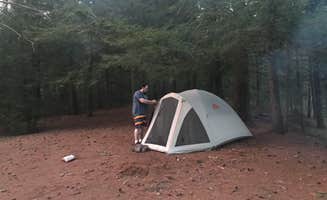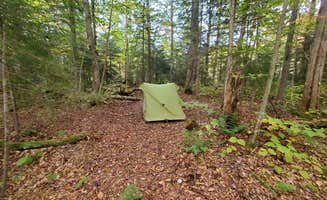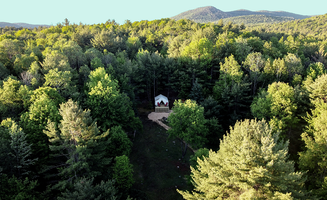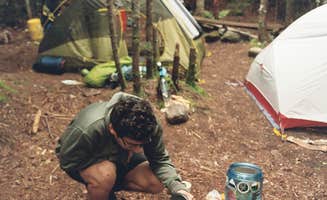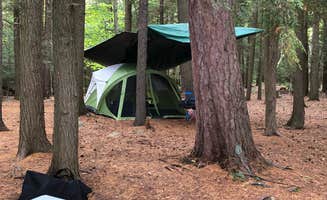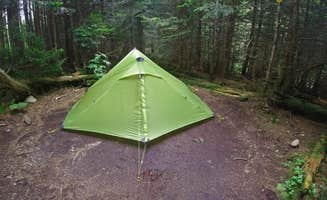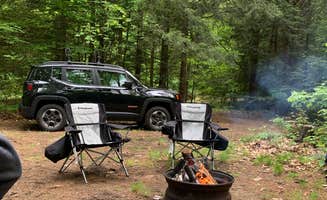Tent camping near Inlet, New York offers versatile options within the Adirondack Park's six-million-acre wilderness. The region sits at elevations ranging from 1,800 to 2,200 feet, creating cooler summer temperatures than surrounding lowlands. Most dispersed sites require a minimum 150-foot setback from water sources, and campers should note that seasonal black fly season typically runs from mid-May through late June.
What to do
Paddling excursions: Tioga Point Campground provides excellent water access for canoe and kayak enthusiasts. "This campground is only accessible by boat. The campsites are private and you can enjoy the beach with crystal clear water," notes Lee W., highlighting the campground's boat-only accessibility that creates a secluded experience.
Fishing opportunities: Saranac Lake Islands offers productive fishing directly from campsites. One camper describes "fishing for pike, bass and sunfish" from their peninsula site. The interconnected lake system provides diverse fishing habitats from shallow bays to deeper channels.
Swimming spots: Natural swimming areas exist throughout the region's lakes. At Alger Island, visitors enjoy water recreation despite boat traffic. "The island would have been much more peaceful if you didn't constantly have boats going by," reports Sarah B., suggesting early morning or weekday visits for quieter swimming conditions.
What campers like
Island isolation: The boat-in requirement for many sites creates exceptional privacy. "One of the best camping trips I have ever experienced. The island we stayed on only had two other sites," reports Gabrielle C. about her stay at Saranac Lake Islands. "We couldn't hear anyone else."
Secluded peninsulas: Several campgrounds feature peninsula sites that offer water views on multiple sides. At Cod Pond Dispersed Pull-Off, campers appreciate the site layout. "Decent site right off of the 'main' road. 'Main' because it was quiet," writes Josie W., noting the "access to the river down a semi-steep bank. Beautiful to listen to at night."
Pristine lakes: The region's water quality remains exceptional. At North Lake Reservoir, campers consistently mention the clean water conditions. "32 sites all around the lake. Some are walk in right on the lake. Quiet, peaceful, and clean," reports J B., emphasizing the pristine nature of the reservoir.
What you should know
Bear precautions: Food storage protocols are strictly enforced. A reviewer for Tioga Point notes, "Watch out for the neighborly bears," suggesting proper food storage is essential. Most sites require hanging food at night or using bear canisters.
Limited facilities: Many sites have minimal infrastructure. "Sites: boat only access. Bring water. Pack in/pack out," writes Benjamin C. about Alger Island, noting the "pit toilets" but lack of other amenities.
Weather variability: Temperature fluctuations require preparation. A Saranac Lake Islands camper advises, "Bring warm clothing for nights; temps can drop 30 degrees in hours," highlighting the need for layered clothing even in summer months.
Tips for camping with families
Lean-to options: Several sites offer lean-to shelters that simplify family camping. "You don't have to bring a tent unless you want to. This definitely saves some space in your boat," reports Carrie J. about Tioga Point Campground, noting this amenity is particularly helpful when packing for children.
Bug protection: Insect preparation remains essential. At Cod Pond, a camper warns, "The bugs were terrible," suggesting families bring sufficient repellent and potentially screened shelters, especially during peak black fly and mosquito season.
Accessible beaches: Some sites feature child-friendly water access. Matthew D. describes Cedar River Entrance Camping as having "a small landing to launch kayaks or canoes" and "beautiful surroundings," making it suitable for families seeking gentle water entry points.
Tips from RVers
Small RV limitations: The region primarily accommodates smaller recreational vehicles. At North Lake Reservoir Campground, campers note the tight access roads. "Make sure to take a left at the start of the lake, the right is all private road and you will have to turn around," advises J B., highlighting the navigation challenges for larger vehicles.
Parking constraints: Even at drive-in sites, turning space can be limited. Taylor A. describes the conditions at Cod Pond: "A car is not recommended. Possible to turn around but you definitely need a smaller SUV," indicating the practical limitations for larger vehicles at dispersed sites.


